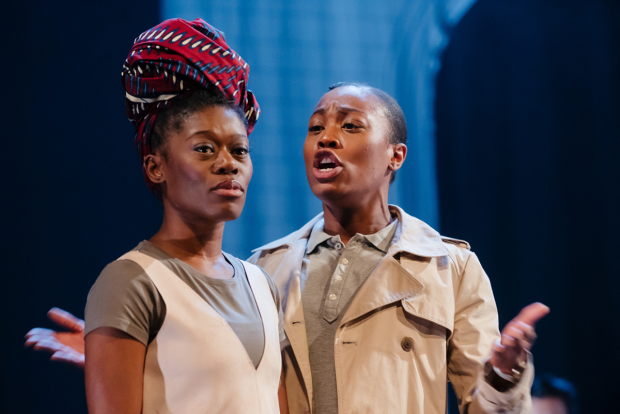Review: Medea (Bristol Old Vic)
There are few worse nights in the theatre than when you enter the auditorium with the highest of hopes and leave a couple of hours later completely underwhelmed.
Director George Mann has been a breath of fresh air to the Bristol theatre scene since he won the National Theatre Quercus Award at the tail end of 2014 and became an associate director of the Bristol Old Vic. It was his dynamic movement work that helped Pink Mist turn into a UK wide hit. His work as co-artistic director of Theatre Ad Infinitum is always eye-widening and worth catching.
Yet here, making his solo directing debut on the main stage with an ambitious, all-female reimagining of Euripides' Medea, he has misjudged. I so much wanted to like it: for its ambition, for placing its women centre stage, for the diversity of casting. Yet I came out, knuckles whitening, head pounding, frustrated about what should have been.
Admittedly it very well could be marmite. At curtain call there were as many loud cheers as there were bemused expressions. For those who get on board with its style, the experience may well be different. For those who don’t manage to, the decision to sing and chant all of Euripides' original text, in a translation by Scottish poet Robin Robertson doesn’t pay off. Its style is Andrew Lloyd Webber at his most rock opera bombast yet without the catchy melodies and delivered with dirge like pace. You can understand the thinking behind the decision: we know that the Greek chorus would have sung and danced their way through the original work. The six-strong cast really commit to what they’re being asked. Yet every time the lights changed to an orange hue to signify the original myth, it was difficult not to sigh and rub ones temples. Much of the poetry within Robertson’s translation is lost because of it. It’s a brave idea that has gone off the rails.
There are things to like. With writer Chino Odimba, Mann has fashioned a modern story to mirror the original, of an army wife betrayed and devising her own form of revenge, that may not be as extreme as the original take but provides just as satisfying a comeuppance. Played straight these characters are fascinating in their own right. The story explores a modern woman’s plight, of giving up a life to support someone else’s career, and what she should expect if her partner absconds. Its politics may divide down Liberal/Tory and gender lines about what she is owed. There will be debates in the bar afterwards.
Mann is a creator of memorable moments. There are points here – a choric anthem towards the end of act one; Medea ascending a staircase like an avenging deity at the end of act two – that force you to hold your breath. Yet other moments drag. In insisting that each line be sung through, he has made an 80 minute work that should hurtle towards its bloody denouement last double that. You feel every minute.
Akiya Henry is an everywoman Medea and her modern equivalent Maddy. It’s a version determined to cast her as the hero but with too little interest in delving deeply into the character flaws inherent within. It leaves the performance feeling undernourished. Medea is one of the great female roles, yet here the domination of a stage one expects from the play, is missing. You suspect that is the point. Stephanie Levi-John is brutish indifference and then quietly affecting as the husband who can’t see the effects his betrayal will have on those around him, while Michelle Fox, Eleanor Jackson, Kezrena James and Jessica Temple work hard and can’t be faulted as the all-singing, chanting, and rhythmic chorus.
It’s a brave and bold take. There is much to applaud. Yet the one key question – does it work? – can’t be applauded so vociferously. A frustrating evening.
Medea runs at Bristol Old Vic until 27 May.











